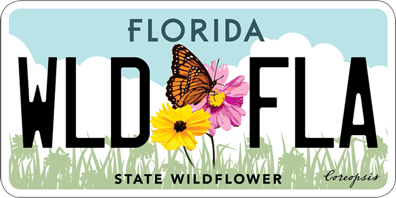Revive growth management now: 1,000 Friends of Florida
by Loraine O’Connell
With Florida growing by up to 1,000 people a day, state leaders need to revive growth management “before rampant development irreparably spoils what makes our state special,” says Paul Owens, president of 1,000 Friends of Florida.
Owens will outline his organization’s plan for restoring growth management at the regional and state levels during a presentation at the Florida Wildflower Symposium on Friday, April 12, in Gainesville. The two-day event will take place at the Straughn UF/IFAS Extension Professional Development Center.
Last August, 1,000 Friends of Florida, in collaboration with seven other environmental groups and the League of Women Voters of Florida, released a report entitled “Trouble in Paradise.” It targets six major priorities for the state’s future, including growth management oversight. Growth directly affects the report’s other priorities, which include protecting Florida’s natural lands and water resources.
Since 2011, local governments have approved scores of developments around the state “with no meaningful” oversight, Owens says. “What happened in 2011 was the governor and Legislature scaled way back on state and regional oversight of growth and development and left things up to local governments,” Owens says.
Unbridled growth and its negative impacts
Such haphazard development creates more traffic, pollutes waterways, and may establish a precedent for building outside of areas designated for development, he says. “That precedent makes it easier for developers in other parts of Florida to get approval for their developments with the same kind of negative impacts on the environment and quality of life,” Owens says.
“Often, the decisions that local governments make have regional or even state implications, so we’re better off with regional and state oversight, which will require legislation,” he adds.
Our state’s water resources, in particular, already are experiencing profound problems because of growth and loss of natural lands, from saltwater intrusion and pollution to wildlife-smothering algae blooms.
If future growth isn’t carefully managed, “even worse water problems are inevitable, along with the other negative impacts of sprawling development, including traffic congestion, strains on public services and budgets, loss of open land critical for wildlife habitat and outdoor recreation, and the inevitable disappearance of plant and animal species,” he says.
Working with lawmakers and citizens
1,000 Friends is determined to advocate directly to legislators and other state leaders, Owens says, and to “work with citizens and their advocacy organizations who share our goals.”
He stresses, though, that his organization and its partners “are not reflexively opposed to all development in Florida.” 1,000 Friends works “with local organizations that are challenging development plans they feel are not consistent with growth management plans in their areas or are not sustainable environmentally.”
Grassroots enthusiasm for controlled growth is there, Owens says; it just needs to be mobilized.
“We hear from organizations up and down the peninsula and extending into the Panhandle that want our advocacy and expertise, so we know there’s interest in these issues throughout Florida.”

